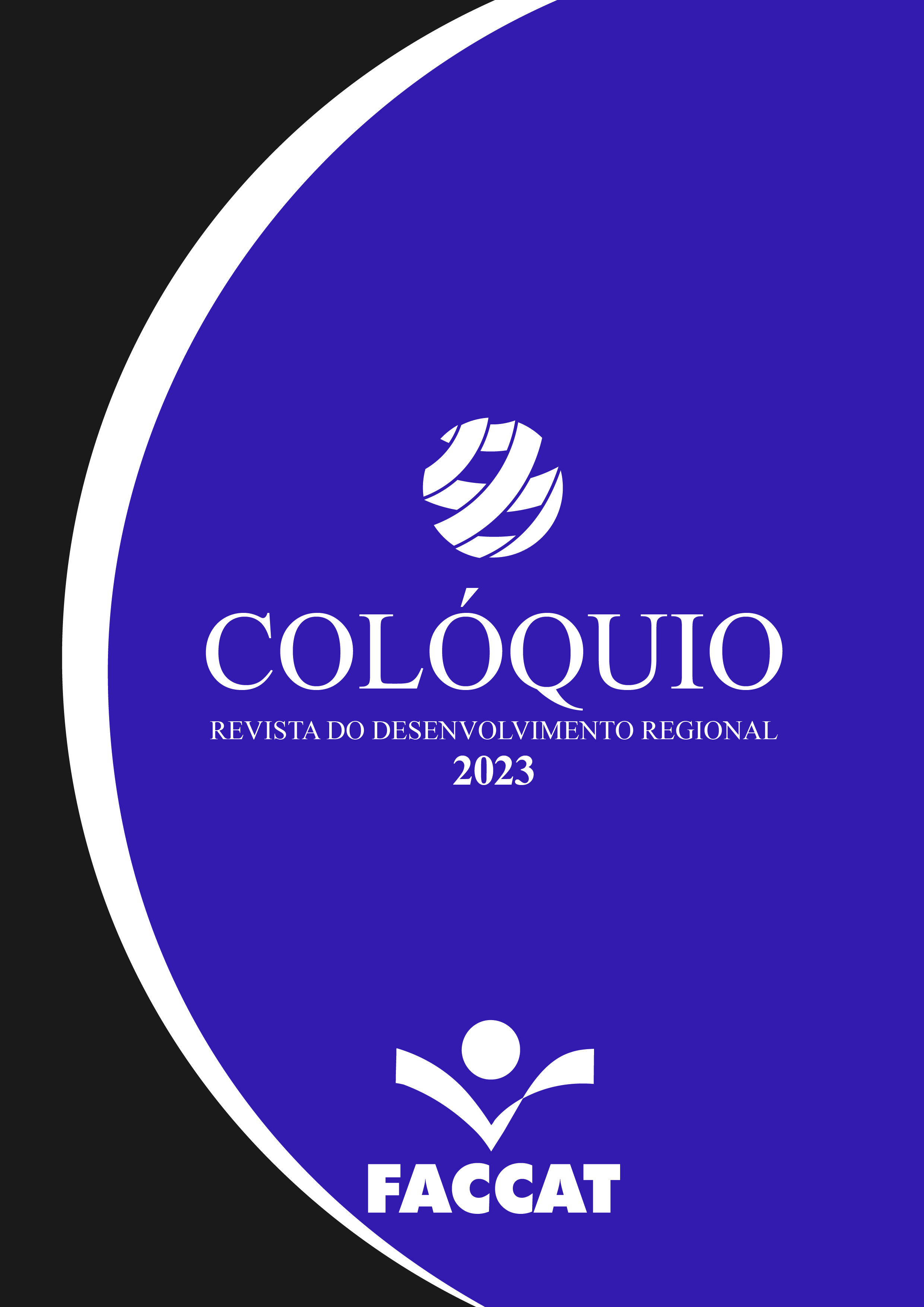Sustainable Development Goals for Smart Cities supported by ICTs: a multiple case study
DOI:
https://doi.org/10.26767/coloquio.v20i3,%20jul./set..2682Keywords:
Cidade inteligente. TICs. Agenda 2030. ODSAbstract
The growth of cities will be an economic model for development, as it is in megacities that major transformations take place and where there are demands for public services, products, housing, transport and employment. In this context, the good use of information and communication technologies (ICTs) can be fundamental for cities to meet such demands. The Sustainable Development Goals (SDGs) aligned with the objectives of projects that have ICT in their development are a gateway to a smarter city. Therefore, the objective of the article is to identify which sustainable development objectives are contemplated in project initiatives that use ICTs in their development in two cities in Rio Grande do Sul. A descriptive qualitative research of multiple cases was carried out based on 12 interviews using a semi-structured script, more information about the projects was sought through secondary data. The interviews were transcribed and content analysis applied to the collected materials. The results showed that the 4 projects include SDGs, so as a practical result, a checklist was formulated that assesses the objectives of each project and serves as a guide for future projects to align their development with the 17 SDGs.
References
AMÉRICO, Bruno. Método de Pesquisa Qualitativa: Analisando fora da caixa a prática de pesquisar organizações. Alta Books, 2021.
BARDIN, L. Análise de conteúdo. São Paulo: Edições 70, 2016.
BOKHARI, Syed Asad A.; MYEONG, Seunghwan. Use of artificial intelligence in smart cities for smart decision-making: A social innovation perspective. Sustainability, v. 14, n. 2, p. 620, 2022.
CAP4CITY MOOCS. Disponível em:< https://www.edx.org/schools-partners>. Acesso em: 7, set. 2022
CARAGLIU, A., DEL BO, C.; NIJKAMP, P. Smart cities in Europe. Proceedings of the 3rd Central European Conference on Regional Science, Košice,p. 1–15, 2009.
CHEN, Gen; ZHANG, Jiawan. Applying Artificial Intelligence and Deep Belief Network to predict traffic congestion evacuation performance in smart cities. Applied Soft Computing, v. 121, p. 108692, 2022.
CREECH, Heather. The Sustainable Development Timeline-2012. 2012. Disponível em:< https://policycommons.net/artifacts/615124/the-sustainable-development-timeline/1595584/> Acesso em:10, set, 2022.
CRESWELL, John W.; POTH, Cheryl N. Qualitative inquiry and research design: Choosing among five approaches. Sage publications, 2016.
CIULLI, Enrico. Tribology and Sustainable Development Goals. In: International Workshop IFToMM for Sustainable Development Goals. Springer, Cham, 2021. p. 438-447.
DAMERI, R. Smart City Implementation - Creating Economic and Public Value in Innovative Urban Systems. Springer International Publishing, Cham, 2017.
DENZIN, Norman K.; LINCOLN, Yvonna S. Introdução: a disciplina e a prática da pesquisa qualitativa. O planejamento da pesquisa qualitativa: teorias e abordagens, v. 2, p. 15-41, 2006.
FEPAM. Fundação Estadual de Proteção Ambiental Henrique Luiz Rossler. Disponível
em: http://www.fepam.rs.gov.br/. Acessado em: 5, set. 2022.
GIBSON, D. V.; KOZMETSKY, G.; SMILOR, R. W. The Technopolis phenomenon : smart cities, fast systems, globais networks. Lanham, Md.: Rowman & Littlefield Publishers, 1992
GIFFINGER, et al. Smart cities. Ranking of European medium-sized cities, Final Report, Centre of Regional Science, Vienna UT, p. 303-320, 2007.
GIFFINGER, R.; GUDRUN, H. Smart City ranking: an effective instrument for the positioning of the City? ACE: Architecture, City and Environment, v. 4, n. 12, p. 7–26, 2010.
HALLA, Pekka; MERINO‐SAUM, Albert. Conceptuais frameworks in indicator‐based assessments of urban sustainability—An analysis based on 67 initiatives. Sustainable Development, 2022.
Instituto Brasileiro de Cidades Humanas, Inteligentes, Criativas e Sustentáveis - IBRACHICS. (2022). Disponível em:< https://ibrachics.org.br/cidades-participantes>. Acesso em: 10, set, 2022.
Instituto Brasileiro de Geografia e Estatística - IBGE. (2022) Disponível em: <https://cidades.ibge.gov.br/brasil/rs/porto-alegre/panorama>. Acesso em: 08, set, 2022
Instituto Brasileiro de Geografia e Estatística - IBGE. (2022) Disponível em: <https://cidades.ibge.gov.br/brasil/rs/caxias-do-sul/panorama>. Acesso em: 08, set, 2022.
JAPIASSÚ, Carlos Eduardo; GUERRA, Isabella Franco. 30 anos do relatório Brundtland: nosso futuro comum e o desenvolvimento sustentável como diretriz constitucional brasileira. Revista de Direito da Cidade, v. 9, n. 4, p. 1884-1901, 2017.
JNR, Bokolo Anthony et al. Digital transformation with enterprise architecture for smarter cities: a qualitative research approach. Digital Policy, Regulation and Governance, 2021.
KHAN et al.,Towards Sustainable Smart City: A Review of Trends, Architectures, Components and Open Challenges in Intel Citie. Sustainable City and Society. v. 38, p. 697- 713. 2018.
KOSTETCKAIA, Mariia; HAMETNER, Markus. How Sustainable Development Goals interlinkages influence European Union countries’ progress towards the 2030 Agenda. Sustainable Development, 2022.
MACKE, J. et al. Smart sustainable cities evaluation and sense of community. Jornal of Cleaner Production, v. 239, p. 118-103, 2019.
MOTA, Suetonio. Planejamento urbano e preservação ambiental. Fortaleza: Universidade Federal do Ceará, 1997
ORGANIZAÇÃO DAS NAÇÕES UNIDAS. ONU – Brasil. ONU Brasil. Disponível em:< https://brasil.un.org/sites/default/files/2021-02/Brasil_Relatorio_Progresso_2019.pdf>. Acesso em: 10, set, 2022.
ROCHA DE SIQUEIRA, Isabel; RAMALHO, Laís. Participatory methodologies and caring about numbers in the 2030 Sustainable Development Goals Agenda. Policy and Society, 2022.
SACHS, I. Ecodesenvolvimento: crescer sem destruir. Edições Vértice, p. 208,1996
STAKE, Robert E. Pesquisa qualitativa: estudando como as coisas funcionam. Penso Editora, 2016.
SIA AMBIENTAL – 2022. Disponível em:<https://siambiental.ucs.br/>. Acesso em: 6, set. 2022.
SILVA, Bhagya Nathali; KHAN, Murad; HAN, Kijun. Towards sustainable smart cities: A review of trends, architectures, components, and open challenges in smart cities. Sustainable Cities and Society, v. 38, p. 697-713, 2018.
SNEDDON, Chris; HOWARTH, Richard B.; NORGAARD, Richard B. Sustainable development in a post-Brundtland world. Ecological economics, v. 57, n. 2, p. 253-268, 2006.
SHUAI, Chenyang et al. Principal indicators to monitor sustainable development goals. Environmental Research Letters, v. 16, n. 12, p. 124015, 2021.
TAQUETTE, Stella R.; BORGES, Luciana. Pesquisa qualitativa para todos. Editora Vozes, 2021
UNIVERSIDADE DE CAXIAS DO SUL DOUTORADO ACADÊMICO EM INOVAÇÃO – UCS-DAI. (2022). Disponível em:< Projetos de Desenvolvimento Tecnológico e Inovação (ucs.br)>. Acesso em: 5, set, 2022
ZORZO, Felipe Bernardi et al. Desenvolvimento Sustentável e Agenda 2030: Uma Análise dos Indicadores Brasileiros. Revista Gestão e Desenvolvimento, v. 19, n. 2, p. 160-182, 2022.







